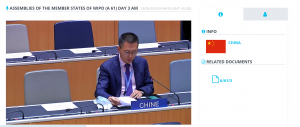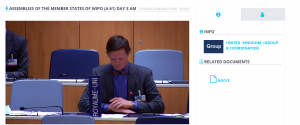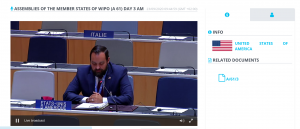On Wednesday, 23 September 2020, China blocked Wikimedia Foundation’s application to become an observer at the World Intellectual Property Organization (WIPO). At this week’s General Assembly, the WIPO was poised to accept the applications of thirteen organization including Wikimedia Foundation and the following organizations including: International Iberian Nanotechnology Laboratory (INL), Association for Recorded Sound Collections (ARSC), Brand Owners Protection Group (Gulf BPG), Independent Alliance for Artists Rights (IAFAR), Intellectual Property Latin American School (ELAPI), Transnational Alliance to Combat Illicit Trade (TRACIT), Women@theTable (Women at the Table), French Association of Industrial and Artisanal Geographical Indications(AFIGIA), Design and Artists Copyright Society (DACS) and Omani Association for Intellectual Property (OAIP); and Research Center for Innovation-Supported Entrepreneurial Ecosystems (RISE).

On Monday, 21 September 2020, China signaled their reservations regarding the admission of observers (although they did not provide any concrete details at the time).
China stated,
On the agenda item 6, on the observers’ applications, we noticed that some of the organizations that applied for observer status have not submitted their documents in accordance with rules. What we meant was some particular nongovernmental organization. And I think we need to have further clarifications for their applications. The Chinese delegation shows its concerns on this subject. and we would discuss this further when we discuss the agenda item 6.
On Wednesday, 23 September 2020, during the WIPO General Assembly’s discussion of the admission of observers, China expressed reservations with Wikimedia Foundation’s application for observer status at WIPO.
China provided the following intervention.
With regards one of the NGOs application to be an observer of the WIPO, we appreciate our constructive consultations. The Chinese delegation would like to request the Assembly to suspend its discussion admitting Wikimedia foundation, WMF to WIPO as an observer, according to criteria and procedures of the observer status at the WIPO, an international NGO should submit a complete list and total number of its national groups or member, showing their country of origin in the case of an international NGO. China notes that in its application documents for observer status, Wikimedia Foundation, being an international NGO declares that WMF does not have member organizations but 124 user groups, 39 geographic chapters and 2 had thematic organizations with which it is affiliated.
Nevertheless, in accordance with their page, this foundation began recognizing chapters and
thematic organizations in 2004, Wikimedia. At the recognition of a chapter and thematic organization, it is approved by the foundation’s board, a chapter agreement, a Wikimedia authorization agreement will be signed. As of October 2015 this foundation had 41 recognized chapters and thematic organizations, one of which is Wikimedia Taiwan, established in the province of China. The description of WMF on the Wikimedia website is inconsistent with the application documents submitted by the foundation to the Assembly for its consideration. Further clarification is thus required.
There is reason to believe that this foundation has been carrying out political activities through its member organizations which could undermine the state’s sovereignty and territorial integrity, therefore, it is not fitting for the foundation to serve as an observer to this professional organization.
China would like to reemphasize that the agenda of this session has been condensed due to the special circumstances under which the Assembly is held, complicated agenda items that require extensive consultations are generally not included and the Chinese delegation welcomes this arrangement, hoping that the same principle could be adhered to during the discussion of all agenda items during this session. China at the same time recalls further that this organization while discussion and making decisions on different agenda items always upholds the principle of consensus, including the discussion of observer status in the past. We had adopted similar principles. Therefore, on the application of this foundation, before the foundation could further clarify such questions as member organizations and Taiwan related positions, we would like to request Assembly to suspend the discussion of admitting it to the WIPO as observers.
The United Kingdom, representing Group B, provided the following response.

Chair, Group B would thank the Secretariat for preparing Document A/61/3 titled admission of observers and is prepared to approve all the requests therein. The document in paragraph 4 sets out that all requests for observer status receive, contain the requisite information, to our understanding that means information to enable the consideration of subsequent granting of observer status. As such, we understand the published requests have complied with all proper procedures. Furthermore, we understand that all of the organizations listed in A/61/3 meet the admission criteria and procedures for applying for observer status at the WIPO as requested by the WIPO on its website, otherwise the Secretariat would not have published their applications. Should this not be the case, we would ask for clarity from the Legal Counsel on this issue. Observer organizations bring technical expertise and insight to the bodies of the WIPO. It has been a common practice at the WIPO to welcome the involvement of a wide diversity of NGOs, IGO, industry groups and other stakeholders as widely as possible in consultation processes and discussions regarding current IP issues. This has been part and parcel of the transparency and inclusiveness we cherish in the WIPO. Group B is unaware of any information that would lead us to believe any of the organizations listed in Document A/61/3 would not be able to bring valuable contributions to our deliberations on current IP issues together with the compliance of the procedural steps, Mr. Chair, we therefore urge approval of the full list of requests for observer status as contained in A/61/3 in this session.
The United States of America, represented by Ambassador Andrew Bremberg, provided the following riposte to China.

Thank you, Mr. Chair. The United States supports the statement made by Group B and the full list of observer applications made in A/61/3. We understand that all applicant organizations listed meet the requirements requested by WIPO otherwise the Secretariat would not have published their applications. We are concerned that a last-minute question about the observer list does not allow potential observers the ability to respond to misunderstandings about their application packages. On the application of the Wikimedia foundation specifically we see that this international NGO is similar to many other NGOs who have views on Copyright related issues and who have already been accepted as WIPO observers. This applicant has already demonstrated its interest in the field of IP and its organization’s link to WIPO’s work, for example, they submitted input to the WIPO AI and IP call for public input. They use the WIPO arbitration and mediation services frequently. Observers are meant to enrich debates and bring views that link to and support the activities and objectives of WIPO. We have no information that would lead us to believe that the applicants would not be able to contribute to our consultations and debates about current IP issues. Therefore, Mr. Chair, we would urge approval of the organizations listed in A/61/3 at this session. However, there is a agreement to simply defer, we will accept that approach. I would say that evaluating an international NGO’s credentials for observer status in WIPO is not a One-China issue. The Wikimedia Foundation’s participation does not raise any questions about the political status of any other Member States allowing the Wikimedia foundation to participate as an observer would be entirely consistent with the established precedent at WIPO of supporting other existing observers and Member States that also have some affiliation with Taiwan. For example, the International Chamber of Commerce, the International Law Association, the Biotechnology Industry Organization just to name a few. We believe Wikimedia’s observer status should be decided on the merits of its application and its ability to contribute to WIPO’s discussion on Intellectual Property issues. Thank you.
The Chair of the WIPO General Assembly, Ambassador Omar Zniber (Morocco) noted that there was no consensus in relation to the admission of Wikimedia Foundation; consequently, the decision of the admission of Wikimedia Foundation would be postponed.
The United States provided these closing remarks.
I just wanted to state the U.S. is disappointed that one observer has been deferred due to this last-minute question despite the fact that the document was published two months ago leaving adequate time for Member States to consult, as well as providing concerned NGOs the opportunity to correct any perceived deficiencies with their applications prior to this General Assembly. We appreciate that Member States agreed to a limited agenda this week, Mr. Chair, as I said, therefore the United States can support your proposed way forward to revisit this proposal at the next General Assembly. When this matter is revisited we strongly encourage Member States to be more transparent and to voice their concerns in a timely manner in order to elevate the issue raised at this session. We look forward to the GA revisiting this issue in the next session.